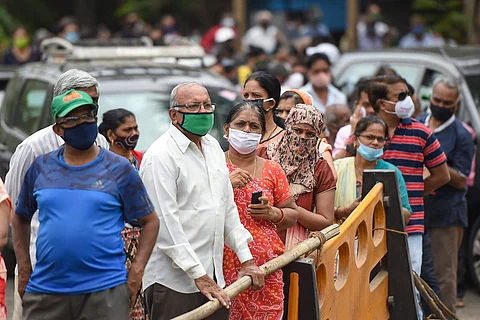

For the past couple of weeks, as elections are underway in many parts of the country, pictures have emerged of huge public election rallies and roadshows, with swelling crowds, people standing in close proximity, most without masks. But despite multiple appeals and demands for ensuring COVID-19 norms are followed, there was no action from the Election Commission. It was only after stinging observations from the Madras High Court two days ago, that the Election Commission stepped up and banned victory rallies on May 2, which is when the election results for four state Assemblies and one Union Territory will be announced.
Eleven High Courts across the country are hearing petitions about the COVID-19 situations in their respective states. The High Courts in Delhi, Mumbai (all benches — Nagpur, Bombay and Aurangabad), Allahabad, Calcutta, Madras, Telangana, and more, are either hearing petitions by citizens or have taken up suo-motu cognisance of the second wave and the lack of healthcare facilities on the ground.
When the political class is unwilling to ensure COVID-19 norms are followed despite rising cases and fatalities across the country, the interventions from the high courts have ensured that authorities are held accountable for the situation on the ground. The Delhi government has been pulled up multiple times by the Delhi High Court. The court came down heavily on the AAP government over its alleged failure to check black marketing of oxygen cylinders and crucial medicines needed by COVID-19 patients. The court said if the state cannot handle the situation, it will ask the Union government to take over gas refiller units as it can't let people die. The Calcutta High Court has directed all authorities in West Bengal to strictly enforce the ban imposed by the Election Commission on rallies and gatherings on May 2. Allahabad High Court even imposed lockdowns in five Uttar Pradesh cities (which was later challenged and stayed by the Supreme Court). The high court had said, “It is a shame that while the government knew of the magnitude of the second wave, it never planned things in advance.”
The Karnataka High Court has hauled up the government and has been issuing a series of instructions, including making public the health infrastructure available in the state and mandating RT-PCR results in 24 hours. The Gujarat High Court asked the state government to formulate a policy for the distribution of Remdesivir injections to hospitals in view of the high demand for the anti-viral drug used for COVID-19 treatment.
After the Telangana High Court pulled up the government for failing to check rising COVID-19 cases, the Telangana government decided to impose a night curfew to restrict the movement of people on the roads.
Elizabeth Sheshadri, a lawyer practising in the Madras High Court, says it is reassuring when the High Courts intervene and hold governments accountable to ensure proper guidelines are followed.
“Because the Madras High Court made some noise about it, the ECI has said no to victory rallies. But even now, in Telangana, pictures have emerged showing that political rallies have been continuing for the upcoming municipal elections. So they (political leaders) on their own are not going to rectify,” says Elizabeth.
There have been multiple occasions when if more than two high courts are hearing a particular matter, the Supreme Court intervenes and matters are often transferred to Delhi, like the migrants' exodus case, the IBC proceedings, etc.
Therefore, when the Supreme Court, headed by ex-CJI SA Bobde, intervened and proposed to withdraw the various pleas in different high courts, and hold a suo-motu hearing on the situation, many legal experts questioned the move, wondering why the apex court was withdrawing cases when they were no glitches or shortcomings on the same.
However, when Justice Bobde retired mid-hearing, the case subsequently came for hearing before a bench headed by Justice DY Chandrachud, who said that the proceedings before them will not supplant High Court hearings, but the apex court cannot remain a spectator amid the serious rise in cases.
The Supreme Court called the massive resurgence of COVID-19 cases a "national crisis" but said that the High Courts are in a better position to monitor the pandemic situation within their territorial boundaries. The bench added that the apex court was playing a complementary role and its intervention must be understood in the correct perspective as there are some matters which transcend the regional boundaries.
"We are playing a complementary role. If High Courts have any difficulty in dealing with issues due to territorial limitations, we will help, said the bench, also comprising Justices L Nageswara Rao and S Ravindra Bhat. “There is a need for top court's intervention on certain national issues as there might be matters related to coordination between states,” it said.
“The High Court is meant to be a checks and balances system. High Courts are empowered to step in, they know local conditions best and local lawyers can bring up the issues before the court in the best way,” says Elizabeth